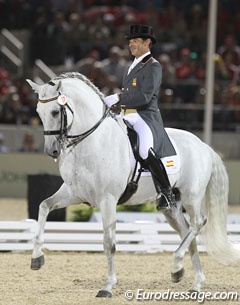
I often mention the importance of the mental side of dressage, but this mental side is a two part story, one of horse and one of rider. The mentality of the horse, his personality, his joy, his free spirit, is equally as important as the rider's own mental concentration. Not only must the two minds work together, but for those really top marks, the performances that give the audience butterflies in their stomach, is created only when the horse's personality is allowed to shine through.
We have all seen top horses lose that spark and go from a 10 horse to a 6. It's not that they lose their talent, or their ability, just that they lose that spirit, the magic that is created with their rider that allows them to shine.
Naturally a very spirited horse, my Batialo makes me spend a lot of days laughing out loud at his character and while it is sometimes a little 'windy' on board, I love that he has got spirit. I love that he just about pushes the door down with his chest when I arrive at the stable and that I had to 'unteach' him Spanish walk after he threw a tantrum and started doing it himself; that in one of his more boisterous days he actually kneed himself square in the face.
For what is the alternative? A horse that is so unhappy he sulks at the back of his box, carries out his required training, and returns again to his concrete corner? So what really happens to a horse when they are trained incorrectly, or with force? They become used to it, they submit to it, but a part of them dies a little with each training session, until all that is left is a robot in the arena, doing as his master is forcing him to do.
 "Of course the spirit is lost in the horse if he is trained incorrectly or with force," says US dressage rider Shannon Peters. "A partnership of horse and rider is shown through a mutual trust and understanding. Only with this level of trust and compassion in training will a horse produce a relaxed and confident expression during a test!"
"Of course the spirit is lost in the horse if he is trained incorrectly or with force," says US dressage rider Shannon Peters. "A partnership of horse and rider is shown through a mutual trust and understanding. Only with this level of trust and compassion in training will a horse produce a relaxed and confident expression during a test!"
Newly elected FEI Dressage Judge General Stephen Clarke watched the world's best combinations take centre stage in London and knows that talent and ability are rare, and that extra something all comes down to the training. "Every horse has a ‘special personality’, but it very much depends upon the training they receive as to whether it ‘shines through’ in their work," says Stephen. "You can tell that a horse has freedom and enthusiasm, (that it enjoys the work), by its apparent willingness to perform the movements, and with the natural energy and elasticity it has whilst doing so."
Again I wondered where the top judges find the margin to promote the happy, spirited horse, above the correct yet obviously forced competitor? "Without true and natural impulsion the movements, even if they are mechanically correct, can often become dull and lifeless, which obviously will not score as highly as the horse with energy, elasticity and expression," Clarke explained.
Certain that harsh training methods change the personality of the horse, Stephen stresses that horses should be willing partners, not brainwashed robots, and you can easily spot the difference by focusing on one key feature. "The eye is the window to the soul," says Stephen, "Just look in there and you can learn a lot."
 A rider that forces his horse into submission, or holds him in a state of contained collection, will therefore never fulfill the true meaning of dressage, because in a sport in which men and woman compete as equals the horse should be a willing and happy participant. "Personally I have never liked the word ‘submission’, to me it should be more about ‘willing co-operation’. Only the willing partner will have the enthusiasm to dance with his rider," Clarke stated.
A rider that forces his horse into submission, or holds him in a state of contained collection, will therefore never fulfill the true meaning of dressage, because in a sport in which men and woman compete as equals the horse should be a willing and happy participant. "Personally I have never liked the word ‘submission’, to me it should be more about ‘willing co-operation’. Only the willing partner will have the enthusiasm to dance with his rider," Clarke stated.
And without the dance, what is it that we are doing? Aiming for a bright dressage future, I asked the Olympic judge how our sport can ensure that those special pairs that enter the ring with personality will come out on top? "I think we are already seeing this and have done for many, many years with the top horses, one only has to think back to horses like Granat or Marzog, both entirely different, but both with great personalities!"
Hoping that the example set by the top riders at the recent Olympic Games in London will inspire generations to come, Stephen is certain we will continue to see more happy horses, showing the crowds that extra special something. "If we follow the training lines set by the good examples, it will lead to more true and trusting partnerships of riders and their horses."
by Sarah Warne for Eurodressage
Photos © Astrid Appels
Related Link
Sarah Warne's Classical Training Articles